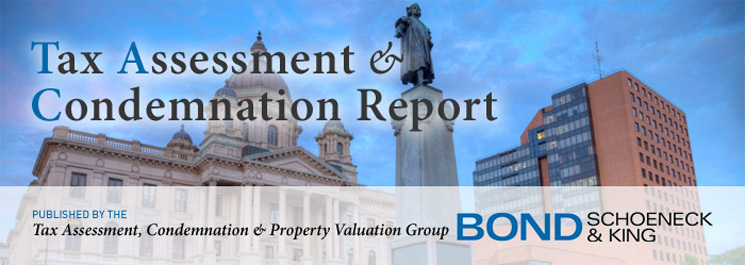
 In Part 1 of this discussion, we highlighted the Appellate Division, Third Department’s holdings on RPTL’s “freeze” provision in the Highbridge Broadway, LLC v City of Schenectady and Scellen v City of Glens Falls cases. As you’ll recall, these Third Department cases held that property owners must annually file a grievance and petition to preserve their right to an assessment reduction (and any refunds) for the additional years that accrue until the case is resolved. Practically speaking, this rule has attorneys on both sides of the “v” preparing and filing documents to fight assessment issues that, really, are already before the court.
In Part 1 of this discussion, we highlighted the Appellate Division, Third Department’s holdings on RPTL’s “freeze” provision in the Highbridge Broadway, LLC v City of Schenectady and Scellen v City of Glens Falls cases. As you’ll recall, these Third Department cases held that property owners must annually file a grievance and petition to preserve their right to an assessment reduction (and any refunds) for the additional years that accrue until the case is resolved. Practically speaking, this rule has attorneys on both sides of the “v” preparing and filing documents to fight assessment issues that, really, are already before the court.
Despite these holdings, at the end of March 2015 the Appellate Division, Fourth Department came to the opposite conclusion in Torok Trust v. Town Board of the Town of Alexandria. Here, the Court held that the petitioner’s failure to file additional challenges on its property for each subsequent assessment year that came and went without settlement or a judgment did not undermine its right to an assessment reduction or refund for those later years. The Court reasoned that these subsequent years were governed by RPTL § 727’s three-year “freeze” provision (i.e., the reduced assessment holds for that last year tried plus the next three), so there was no need for the repetitive/protective annual filings. The Fourth Department further declared that RPTL § 727 was intended to reduce the need for repeated litigation, and further, that RPTL § 726 (refund, credit of taxes) provided assessors with a mechanism to make any assessment or tax roll corrections. In other words, one Court does not think there is any need to file cases year after year on the same property to preserve petitioners’ rights to a reduction or refund. Apparently, this Court finds that one year of filing is enough, with RPTL § 727’s “freeze” provision operating to reduce the assessment on that property in the next (at least 3) years to the value determined by the court for the last year at issue.
So now New York’s Appellate Division courts are divided as to whether “protective” annual tax certiorari filings are necessary. This begs the question: will the Court of Appeals decide whether the assessments are frozen so as to resolve subsequent filings – or will they just let it go?